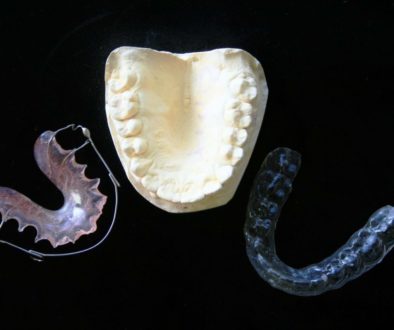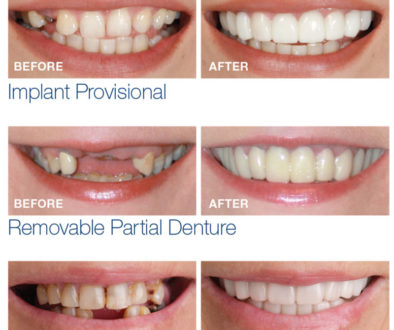How to Get Used to Wearing A Night Guard (Or Any Other Dental Appliance)
 I’ve made a lot of custom night guards, snoring appliances, and TMJ appliances for my patients over the years. More often than I’d like to admit, I see them back for their six month check-up and when asked they tell me that they haven’t been wearing their appliance. It is on a bedside table or drawer gathering dust.
I’ve made a lot of custom night guards, snoring appliances, and TMJ appliances for my patients over the years. More often than I’d like to admit, I see them back for their six month check-up and when asked they tell me that they haven’t been wearing their appliance. It is on a bedside table or drawer gathering dust.
I always feel like a bit of a failure when they tell me this. They usually spent a good deal of money on the appliance and aren’t getting any benefit out of it.
The truth of the matter is that getting used to wearing a night guard or any other type of dental appliance at night is really challenging initially. Let’s look at some ways that you can make this an easier process so that you don’t end up one of those people who wasted money on a dental appliance.
Objections To Wearing A Night Guard
Most patients tell me they only tried for a couple of nights before giving up. Their most common reasons why they don’t wear it?
- It feels too tight
- It is uncomfortable
- It makes them gag
- They drool too much
- They take it out in the middle of the night without knowing it
Let’s take these objections one by one…
It feels too tight:
People are really worried that a new appliance is going to move their teeth if it is too tight! Fortunately, this really doesn’t happen with these types of dental appliances. That feeling of tightness is actually a good sign that it fits well to your teeth and that it will stay in while you sleep. It is much better that it is tight than loose. Unless the tightness is unusually severe, you’ll get used to the feeling after you’ve worn it for a couple of nights.
If after trying it for a couple of nights, it is making one or two teeth really sore or is still very uncomfortable, go back to your dentist and have them adjust it. They can very easily remove a small amount of material inside the night guard so that it isn’t quite so tight. Whatever you do, don’t give up right away!
It is uncomfortable:
You know what I say to them? I agree with you! When you first start wearing a night guard or other dental appliance it is absolutely uncomfortable. Sticking a hard piece of plastic in your mouth is unnatural and new. It takes an adjustment period to get used to it. Your brain has this wonderful ability to block out sensations that are familiar. If you consistently wear it at night your brain will eventually get used to so that you barely notice it is there. This process usually takes a couple of weeks.
It makes you gag:
Did you know that your gag reflex is mostly mental? With a little time you can overcome the vast majority of your gag reflex.
You know how I know this? Because I used to be the worst gagger that there ever was. When I was a child, I was the one down the hall you could hear gagging repeatedly throughout the appointment. I gagged on my toothbrush while brushing in the morning and good luck ever getting a dental impression on me.
When I was in dental school, we had to take dental impressions on each other. The thought briefly crossed my mind that I wasn’t going to survive this process. The first couple of impressions on me weren’t pretty. I did my usual gagging thing. But then something magical happened! I calmed myself, breathed deeply through my nose, and relaxed. The rest of the impressions (15 in all!) went smoothly. That is when I first realized that a gag reflex is something than can be overcome. If I can do it, you can too!
Try putting it in during the day for short periods of time and work on relaxing while it is in. The key is to breathe deeply through your nose and relax your entire body. Once you get comfortable wearing it for short periods during the day, you can start wearing it at night.
It makes you drool:
Those first couple of nights you wear your night guard you’re going to wake up with a pillow soaked through with drool. I know, I know! Not the most attractive sight, especially if you sleep next to someone else. The good news? The drooling is temporary. Your brain reacts to something new in your mouth by producing extra saliva. It is used to only food going in your mouth and staying there. Once your brain has had a chance to get used to this new appliance it will stop your body from producing all that extra saliva.
You take it out in the middle of the night:
So let’s say you made it past all the previous objections, put that appliance in, and fell asleep. Success right? Then you wake up in the morning and can’t even find it. As you get out of bed, you notice it halfway across the room, on the floor. Apparently you woke up in the middle of the night, took it out, and threw it across the room all without even knowing it.
If you’ve read the rest of this article you probably know what I’m going to say now. Yep, give it some time! Your brain and body needs time to get used to it. Once you start to forget it is there you’ll stop taking it out at night.
Other Options If You Can’t Get Used to Your Night Guard
If you’ve worn your appliance consistently for 2-3 weeks and still can’t get used to it, it is time to look at other options.
Over the counter night guards
If you’re wearing a standard over the counter night guard that you had to boil and bite into in order to form it, you should really consider investing in a custom night guard. Over the counter night guards tend to be extremely bulky and uncomfortable. Custom night guards on the other hand can be made to fit your teeth exactly and are typically much lighter and less bulky.
Have your dentist adjust the night guard
Your dentist may need to adjust your night guard. They can adjust how tight it is, smooth rough or sharp areas, or how you are biting on it.
Try a differently designed appliance
There are several different designs for night guards, snoring appliances, and TMJ appliances. For night guards specifically, they can be made to fit on either the top or bottom teeth. Some people find one or the other to be more comfortable for them. They can also be made where they only cover some of the front teeth. This is especially helpful for people who are major gaggers and just aren’t able to get over it yet.
Another option for design is to use a thinner material. Reducing the bulk of the night guard can really help with getting used to wearing it. The biggest downside to a thinner material is that it will wear out more quickly, especially if you grind heavily. I’ve seen some people chew through them in as little as six months.
In Summary
#1: Keeping trying! If you’ve gotten nothing else out of this article, remember that if you keep wearing it you will eventually used to wearing it. Many people tell me that after wearing a night guard for years, they can’t sleep without one because it feels strange!
#2: Give it at least 2-3 weeks. 3 weeks is about the average amount of time it takes to build a permanent habit.
#3: If it is super uncomfortable or you haven’t been able to get used to it after a couple of weeks, go back and see your dentist for help. It is much better to go see your dentist than just give up and hide the appliance away somewhere. Remember that there is a good reason why you need to wear the appliance and that your dentist wants to see you succeed with it as well. Don’t be afraid to ask about a different design if the current one isn’t working.



